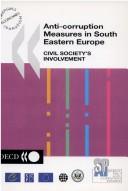| Listing 1 - 3 of 3 |
Sort by
|
Book
ISBN: 9287146942 Year: 2001 Publisher: Strasbourg : Council of Europe,
Abstract | Keywords | Export | Availability | Bookmark
 Loading...
Loading...Choose an application
- Reference Manager
- EndNote
- RefWorks (Direct export to RefWorks)

ISBN: 1280034955 9786610034956 9264175369 926419746X Year: 2002 Publisher: Paris : OECD Publishing,
Abstract | Keywords | Export | Availability | Bookmark
 Loading...
Loading...Choose an application
- Reference Manager
- EndNote
- RefWorks (Direct export to RefWorks)
This report provides policymakers, legislators, businesses, civil society organisations and other stakeholders with an assessment of the legal and institutional environment in which civil society operates, together with recommendations for reform designed to enable civil society organisations, business associations, trade unions and the media to play a more active role in the fight against corruption. The report covers a wide range of issues including public attitudes, civil liberties, existing laws that facilitate the establishment of civil society organisations, freedom of the media, governmental transparency and co-operative partnerships between governments and civil society.
Civil society. --- Misconduct in office -- Balkan Peninsula. --- Political corruption -- Balkan Peninsula. --- Stability pact anti-corruption initiative. --- Political corruption --- Misconduct in office --- Civil society --- Law - Non-U.S. --- Law, Politics & Government --- Law - Europe, except U.K. --- Malfeasance in office --- Misfeasance in office --- Official misconduct --- Boss rule --- Corruption (in politics) --- Graft in politics --- Malversation --- Political scandals --- Politics, Practical --- Corrupt practices --- Social contract --- Administrative responsibility --- Corruption --- Stability Pact Anti-Corruption Initiative. --- SPAI --- SPAI Compact and Action Plan --- Bribery --- Prévarication --- Société civile --- Stability Pact Anti-Corruption Initiative
Book
ISBN: 3531160397 9786613172747 1283172747 3531914170 Year: 2009 Publisher: Wiesbaden : VS Verlag fur Sozialwissenschaften / GWV Fachverlage GmbH, Wiesbaden,
Abstract | Keywords | Export | Availability | Bookmark
 Loading...
Loading...Choose an application
- Reference Manager
- EndNote
- RefWorks (Direct export to RefWorks)
The transformation of Eastern Europe has challenged the characteristics of patron-client relations both in their context and meaning. The former patrimonial frameworks and patterns have worn out while global power and increasing disparities overwhelm traditional systems of patronage. Plamen K. Georgiev discusses the controversial issues of endemic corruption, state capture, institutional fraud, and networks of organized crime in South East Europe and in a wider global context. He traces back types of patronage and patron-client relations through the ages up to modernity. The author critically comments on shifts of loyalties, friendship, nepotism as well as on deficits of constitutional and public procurement in the context of “quasi-democracies” on the Balkans. His analysis is based on empirical findings and sociological observations made during the past seven years. Finally, the author presents valuable methodological suggestions for innovative interdisciplinary research in this field.
Corruption -- Balkan Peninsula. --- Patron and client -- Balkan Peninsula. --- Patronage, Political -- Balkan Peninsula. --- Corruption --- Patron and client --- Patronage, Political --- Political Science - General --- Government - Europe --- Government - Non-U.S. --- Political Science --- Law, Politics & Government --- History --- Political corruption --- Boss rule --- Corruption (in politics) --- Graft in politics --- Malversation --- Political scandals --- Politics, Practical --- Political patronage --- Spoils system --- Corrupt practices --- Social sciences. --- Political science. --- International relations. --- Sociology. --- Social Sciences. --- Sociology, general. --- Political Science. --- International Relations. --- Misconduct in office --- Civil service reform --- Coexistence --- Foreign affairs --- Foreign policy --- Foreign relations --- Global governance --- Interdependence of nations --- International affairs --- Peaceful coexistence --- World order --- National security --- Sovereignty --- World politics --- Administration --- Civil government --- Commonwealth, The --- Government --- Political theory --- Political thought --- Politics --- Science, Political --- Social sciences --- State, The --- Social theory
| Listing 1 - 3 of 3 |
Sort by
|

 Search
Search Feedback
Feedback About UniCat
About UniCat  Help
Help News
News